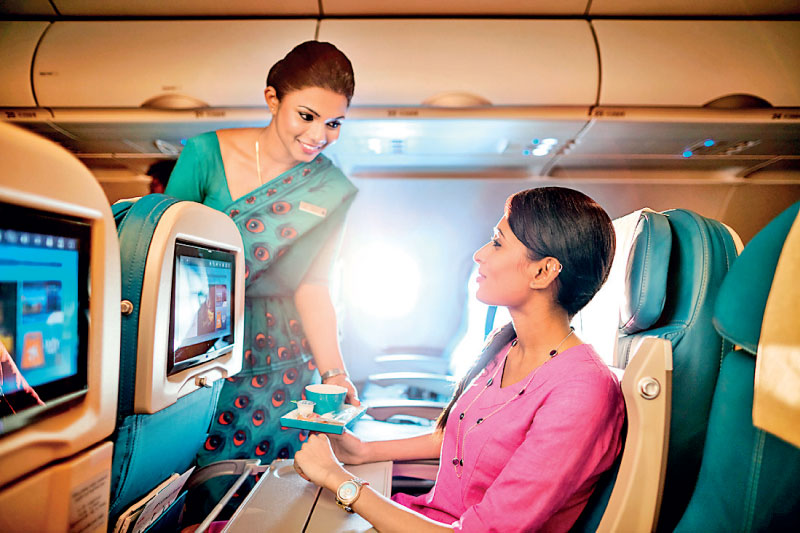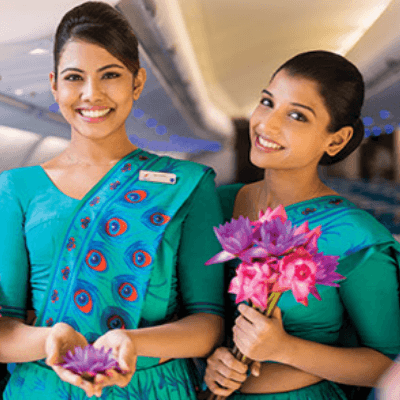(Supreme Global Holdings Is in The Race to Acquire Sri Lankan Airlines With A Consortium Formed With India's Sherisha Technologies & Qatar's MBS Global Investments)
As I continue my journey aboard Sri Lankan airlines flight UL 225, I am reminded of the incredible potential that lies within our national carrier.
The familiar warmth and impeccable service of the crew embody the very ethos we aim to amplify on a global scale.
It is this unique Sri Lankan spirit that fuels my conviction in advocating for the involvement of a local company—a shift that promises not only to preserve but to magnify our national pride and economic resilience.

Enhancing economic impact
The full or partial ownership of Sri Lankan airlines by a Sri Lankan company would anchor substantial economic benefits locally, ensuring that the profits generated are invested back into our economy. This approach not only supports our GDP but also fosters a symbiotic growth between the airline and ancillary industries such as tourism, hospitality, and transportation. Our strategic plan includes leveraging the airline's operations to stimulate these sectors, thereby creating a holistic uplift of the national economy.
Cultivating national identity through global reach
 The ownership of our national carrier offers an unparalleled opportunity to showcase the richness of Sri Lankan culture and hospitality. We envision aircraft that are not merely transport vessels but ambassadors of our heritage.
The ownership of our national carrier offers an unparalleled opportunity to showcase the richness of Sri Lankan culture and hospitality. We envision aircraft that are not merely transport vessels but ambassadors of our heritage.
Each flight will serve as a canvas for the cultural, culinary, and natural wonders of Sri Lanka, enticing global travelers to explore our island. By integrating elements of Sri Lankan art, cuisine, and traditional entertainment into the travel experience, we can make sri lankan airlines a synonym for the country's warmth and diversity.
Securing jobs and building local expertise
central to our vision is the commitment to enhance employment and career growth for sri lankans within the airline and related sectors. By focusing on training and development, we plan to elevate the skill sets of our workforce, preparing them not only to excel within the national borders but also on the international stage. This initiative will include partnerships with world-class aviation training facilities to ensure our crew and ground staff meet and exceed the highest international standards.
Informed by past airline restructurings
My commitment to acquiring ownership is deeply informed by a detailed study of past successful airline restructurings. For example, the transformation of delta airlines through chapter 11 reorganization, which allowed it to emerge as a stronger market player, and the strategic realignment of iberia, which involved a merger with british airways, creating one of the world's largest airline groups. These examples provide critical insights into managing operational, financial, and market challenges, demonstrating that with the right strategies, significant turnarounds are possible.
Strategic initiatives for operational excellence
 Our future plans involve a comprehensive overhaul of both management practices and the technological framework of the airline. key initiatives will include:
Our future plans involve a comprehensive overhaul of both management practices and the technological framework of the airline. key initiatives will include:
1. Expanding & modernizing the fleet: expanding and upgrading our fleet to more fuel-efficient models will reduce operational costs and enhance our environmental sustainability efforts. This step will also align with global best practices in reducing carbon emissions.
2. Optimizing route efficiency: we intend to analyze and optimize our flight routes, ensuring that each route is economically viable and strategically aligned with our broader goals. This may involve opening new routes to high-demand destinations and reconsidering underperforming ones, ensuring a balance between profitability and service.
3. Investing in technology: implementing state-of-the-art aviation technology for better resource management, predictive maintenance, and customer service enhancements will be pivotal. This will include advanced booking systems, ai-driven analytics for customer preference tracking, and an upgraded in-flight entertainment system.
4. Enhancing customer service: we plan to set a new standard in customer service, offering personalized travel experiences that begin before boarding and extend beyond landing. Our aim is to transform customer interactions at every touchpoint, leveraging technology to provide seamless service and real-time solutions to in-flight requests.
5. Strengthening financial stability: fiscal health is paramount. We aim to restructure the airline's debt, attract strategic investments, and improve revenue management. by diversifying revenue streams through enhanced cargo services, more competitive pricing strategies, and innovative loyalty programs, we will work towards a financially robust airline.
 The strategic geopolitical position of Sri Lanka can be vastly leveraged through the involvement of a local company in the airline.
The strategic geopolitical position of Sri Lanka can be vastly leveraged through the involvement of a local company in the airline.
Controlling our air routes and service agreements directly supports our diplomatic and trade relations, offering us the flexibility to navigate international waters according to our own national interests.
Fundamentally, the revitalization of Sri Lankan airlines is a matter of national pride. We will engage with local communities, listening to their insights and integrating their needs into our strategic planning.
Celebrating our national identity, we will invite Sri Lankans to take part in naming new aircraft, participating in the design of liveries, and contributing to the in-flight entertainment content, turning Sri Lankan airlines into a true emblem of national pride.
Dispelling the myth: the case for local involvement over foreign airline acquisition

2. Economic drain away from national interests: profits generated by Sri Lankan airlines, under foreign ownership, are more likely to be repatriated, benefiting another country's economy instead of reinvesting into our own. This represents a significant loss in potential economic benefits that could have bolstered our national financial health.
3. Loss of job autonomy: in scenarios of foreign acquisition, operational consolidations are common, potentially leading to job redundancies in the local workforce. This undermines job security for Sri Lankans and can erode the skilled labor base that would benefit more from investments in local training and development initiatives.
4. Dilution of national identity: an airline serves as a cultural ambassador. under foreign ownership, the distinctive Sri Lankan hospitality and cultural representation might be diluted to conform to a broader, less specific brand identity. this dilution can reduce the unique customer experience that can be leveraged to boost tourism and national pride.

Counterexamples from global best practices
Looking at the global landscape, several successful airlines have thrived under national or independent ownership, countering the argument for the necessity of foreign airline control:
- Singapore airlines: a stellar example of a successful national carrier that has maintained operational independence and is renowned for its exceptional service quality and profitability.
- Qantas: originally government-owned, now privatized and thriving as an independent entity, Qantas continues to promote Australian tourism and culture globally while ensuring economic benefits flow back into its home country.
- Emirates and Etihad: both airlines are owned by their respective states and have become global leaders, demonstrating the potential of state-owned enterprises to compete on a global scale while promoting national interests.

Strategic advantages of local ownership
1. Aligned economic development: local ownership ensures that the strategic directions of sri lankan airlines are closely aligned with the nation's economic policies and development goals, such as enhancing tourism and international trade.
2. National sovereignty: retaining ownership within the country safeguards our national sovereignty, allowing us to make autonomous decisions that directly benefit our geopolitical and economic landscapes.
3. Enhanced local employment: by prioritizing local ownership, we can focus on creating and sustaining high-quality employment opportunities, fostering an environment of professional growth and skills development within the country.
Innovative future plans under local ownership
Under local stewardship, we plan to revolutionize sri lankan airlines with innovative strategies:
- Technological advancements: implementing cutting-edge technology for operational efficiency and to enhance passenger experiences, from seamless check-in procedures to personalized in-flight services.
- Expansion of direct routes: strategically expanding our direct routes to foster greater connectivity and economic partnerships globally, avoiding the pitfall of turning our hub into a mere spoke of a foreign entity's network.
- Sustainability initiatives: adopting sustainable practices to not only comply with international environmental standards but also to lead in eco-friendly aviation developments.
The journey of Sri Lankan airlines should be directed by those who understand its value to our nation both as an economic engine and a source of national pride. As I experience the dedication of our airline's staff firsthand, it becomes clear that empowering a Sri Lankan company to take ownership is not just a viable option but a strategic imperative that promises a more prosperous and self-sufficient future. By refuting the myth of foreign superiority in airline management, we pave the way for a revival that respects our heritage and empowers our people.
R.M. Manivannan
Chairman - Supreme Global Holdings
Related News:





















